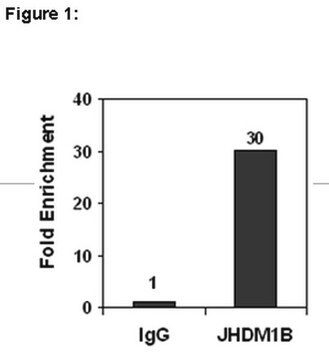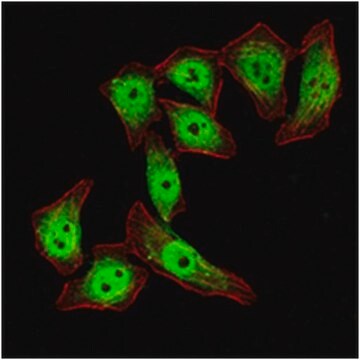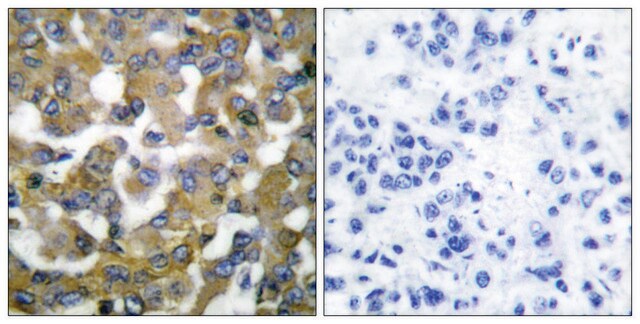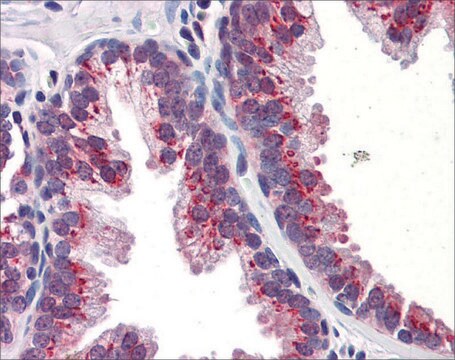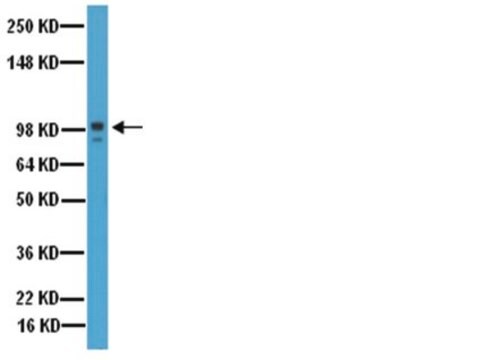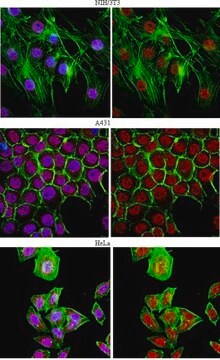추천 제품
생물학적 소스
rabbit
항체 형태
serum
항체 생산 유형
primary antibodies
클론
polyclonal
종 반응성
mouse
포장
antibody small pack of 25 μL
기술
ChIP: suitable (ChIP-seq)
immunoprecipitation (IP): suitable
western blot: suitable
동형
IgG
NCBI 수납 번호
UniProt 수납 번호
타겟 번역 후 변형
unmodified
유전자 정보
mouse ... Klf4(16600)
일반 설명
Krueppel-like factor 4 (UniProt: Q60793; also known as Epithelial zinc finger protein EZF, Gut-enriched krueppel-like factor, KLF4) is encoded by the Klf4 (also known as Ezf, Gklf, Zie) gene (Gene ID: 16600) in murine species. Klf4 is a member of the krueppel C2H2-type zinc-finger protein family that regulates multiple biological processes, including proliferation, differentiation, development, and apoptosis. KLF4 is a developmentally regulated transcription factor that plays an important role in maintaining the pluripotent state in embryonic stem cells (ESCs) and can be used as a marker of the pluripotent state for cells in culture. It can serve both as activator and as repressor depending upon its environment, but its most prominent function is growth suppression. Interestingly, increased expression of Klf4 leads to an increase in expression of P21WAF1/CIP1, which is an important checkpoint protein that inhibits cell cycle progression and is essential in mediating the cell cycle arrest at both the G1/S and G2/M boundaries. Klf4 also mediates the normal functions of the tumor suppressor p53 and contributes to the down-regulation of p53/TP53 transcription. Mutations in Klf4 gene can lead to unchecked growth and tumor formation. KLF4 is shown to be often mutated in many colon cancer cell lines and the lack of Klf4 expression is correlated with colorectal cancer pathogenesis. Elevated expression of Klf4 gene has been linked to gastric cancer, breast cancer, and squamous cell carcinomas. KLF4 is reported to target the primary miR1-2 loop promoter and stimulates miR-1 expression. Loss of KLF4 expression is considered as a mechanistic link between aggressive prostate cancer progression and low canonical AR output through miR-1 inactivation. (Ref.: Jiang, J., et al. (2008). Nat. Cell Biol. 10(3); 353-360; Siu, MK et al. (2016). Oncogenesis 5: e282).
특이성
This rabbit polyclonal antibody detects Klf4 in mouse embryonic stem cells.
면역원
Epitope: unknown
GST/His-tagged recombinant fragment corresponding to 320 amino acids from the N-terminal and internal region of murine Klf4.
애플리케이션
Anti-KLF4, Cat. No. ABE2860, is a highly specific rabbit polyclonal antibody that targets Krueppel-like factor 4 (Klf4) and has been tested for use in ChIP-seq, Chromatin Immunoprecipitation (ChIP), Immunoprecipitation, and Western Blotting.
Immunoprecipitation Analysis: A representative lot immunoprecipitated KLF4 in Immunoprecipitation applications (Jiang, J., et. al. (2008). Nat Cell Biol. 10(3):353-60).
Chromatin Immunoprecipitation Analysis (ChIP): A representative lot detected KLF4 in Chromatin Immunoprecipitation applications (Edupuganti, R.R., et. al. (2017). Stem Cell Reports. 9(4):1291-1303).
Western Blotting Analysis: A representative lot detected KLF4 in Western Blotting applications (Chen, X., et. al. (2008). Cell. 133(6):1106-17).
ChIP-seq Analysis: A representative lot detected KLF4 in ChIP-seq applications (Chen, X., et. al. (2008). Cell. 133(6):1106-17).
Chromatin Immunoprecipitation Analysis (ChIP): A representative lot detected KLF4 in Chromatin Immunoprecipitation applications (Edupuganti, R.R., et. al. (2017). Stem Cell Reports. 9(4):1291-1303).
Western Blotting Analysis: A representative lot detected KLF4 in Western Blotting applications (Chen, X., et. al. (2008). Cell. 133(6):1106-17).
ChIP-seq Analysis: A representative lot detected KLF4 in ChIP-seq applications (Chen, X., et. al. (2008). Cell. 133(6):1106-17).
Research Category
Epigenetics & Nuclear Function
Epigenetics & Nuclear Function
품질
Evaluated by Western Blotting in mouse embryonic stem cells.
Western Blotting Analysis: A 1:5,000 dilution of this antibody detected KLF4 in lysate from mouse emmbryonic stem cells.
Western Blotting Analysis: A 1:5,000 dilution of this antibody detected KLF4 in lysate from mouse emmbryonic stem cells.
표적 설명
~55 kDa observed; 51.88 kDa calculated. Uncharacterized bands may be observed in some lysate(s).
물리적 형태
Rabbit polyclonal antiserum with 0.05% sodium azide.
Unpurified
저장 및 안정성
Stable for 1 year at -20°C from date of receipt. Handling Recommendations: Upon receipt and prior to removing the cap, centrifuge the vial and gently mix the solution. Aliquot into microcentrifuge tubes and store at -20°C. Avoid repeated freeze/thaw cycles, which may damage IgG and affect product performance.
기타 정보
Concentration: Please refer to lot specific datasheet.
면책조항
Unless otherwise stated in our catalog or other company documentation accompanying the product(s), our products are intended for research use only and are not to be used for any other purpose, which includes but is not limited to, unauthorized commercial uses, in vitro diagnostic uses, ex vivo or in vivo therapeutic uses or any type of consumption or application to humans or animals.
적합한 제품을 찾을 수 없으신가요?
당사의 제품 선택기 도구.을(를) 시도해 보세요.
Storage Class Code
12 - Non Combustible Liquids
WGK
WGK 1
Flash Point (°F)
Not applicable
Flash Point (°C)
Not applicable
시험 성적서(COA)
제품의 로트/배치 번호를 입력하여 시험 성적서(COA)을 검색하십시오. 로트 및 배치 번호는 제품 라벨에 있는 ‘로트’ 또는 ‘배치’라는 용어 뒤에서 찾을 수 있습니다.
자사의 과학자팀은 생명 과학, 재료 과학, 화학 합성, 크로마토그래피, 분석 및 기타 많은 영역을 포함한 모든 과학 분야에 경험이 있습니다..
고객지원팀으로 연락바랍니다.